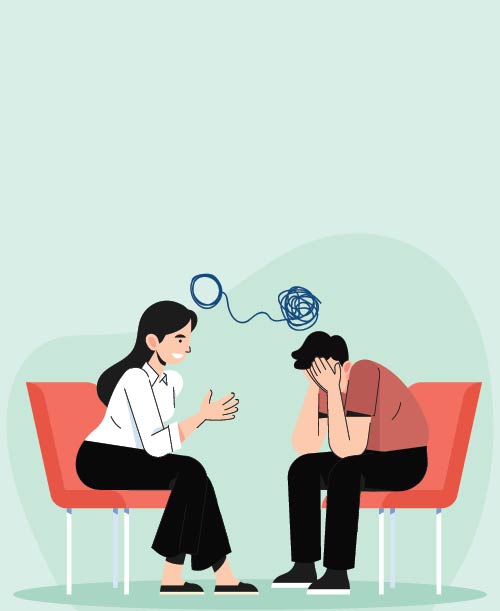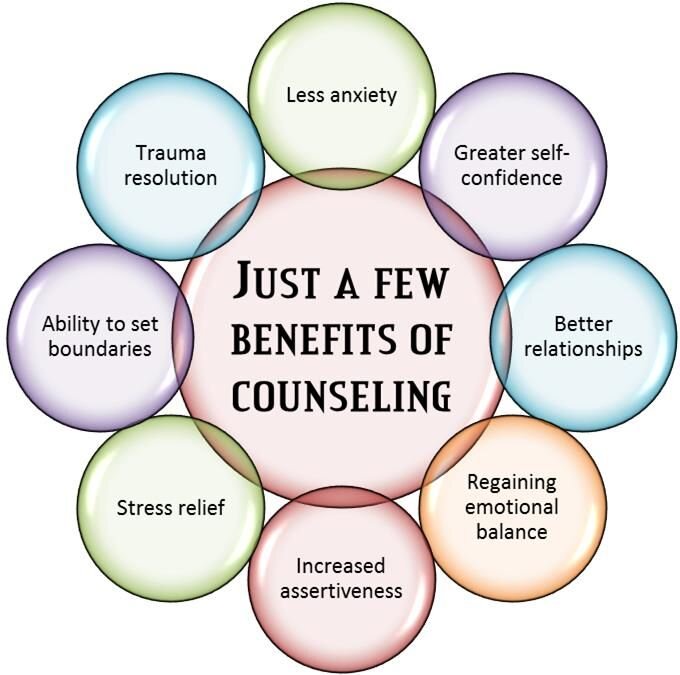Comprehensive Overview to Mental Wellness: Recognizing Counseling, Therapy, and Available Resources
Psychological health and wellness is an essential element of total well-being. Comprehending the various forms of counseling and treatment can encourage people facing difficulties. Each therapy type is developed to fulfill details requirements, using customized assistance. Many stay unaware of the resources available to them. This guide aims to light up these choices, addressing common worries and barriers. It elevates an essential question: exactly how can one successfully browse the complexities of psychological wellness assistance?
Comprehending Mental Health and Its Importance
Mental wellness acts as an important foundation for general health, influencing how individuals think, really feel, and connect with others. It encompasses psychological, mental, and social aspects, affecting daily functioning and high quality of life. Great mental health and wellness promotes resilience, making it possible for people to cope with tension and navigate difficulties successfully. On the other hand, poor mental health can result in a variety of issues, including anxiety, depression, and trouble in relationships.Understanding mental health is important, as it helps to reduce preconception and motivates open discussions about psychological battles. Recognition of psychological health additionally highlights the value of self-care and looking for help when required. Individuals that prioritize their mental health are more probable to involve in healthy actions, maintain satisfying partnerships, and add positively to their areas. Acknowledging the importance of psychological wellness fosters an alternative approach to wellness, ultimately boosting the total lifestyle for individuals and society overall.

Kinds of Counseling and Therapy
Efficient psychological health treatment usually includes numerous types of therapy and treatment customized to individual demands. One typical kind is individual therapy, where a therapist functions individually with a client to address certain concerns. Group treatment, on the other hand, permits individuals to share experiences and support each other in an organized setting, often led by a facilitator. Family members therapy concentrates on boosting interaction and dealing with conflicts within household characteristics, while couples therapy addresses connection obstacles between partners.Additionally, specialized therapy kinds, such as occupation counseling or sorrow therapy, target particular life circumstances - Cognitive Behavioural Therapy. Cognitive-behavioral treatment (CBT) highlights the relationship between ideas, sensations, and behaviors, whereas holistic techniques might incorporate numerous methods, including mindfulness and art treatment. Each kind offers distinct objectives, providing diverse paths for people seeking to boost their mental health and wellness
Usual Therapeutic Techniques
Numerous healing techniques play a crucial function in mental health and wellness therapy. Cognitive Behavior Therapy concentrates on altering adverse thought patterns, while Psychodynamic Treatment Strategies explore unconscious processes. Humanistic techniques emphasize personal growth and self-actualization, using diverse pathways for healing.
Cognitive Behavior Treatment
Cognitive Behavior Modification (CBT) attracts attention as an extensively recognized strategy in the field of mental wellness treatment, highlighting the connection between habits, feelings, and thoughts. This structured, ambitious therapy aims to determine and challenge adverse thought patterns, making it possible for individuals to create healthier coping mechanisms. CBT is commonly used to resolve numerous mental wellness problems, consisting of stress and anxiety, depression, and obsessive-compulsive problem. Sessions typically entail the specialist and client working collaboratively to evaluate and establish details objectives progression. Strategies made use of in CBT may consist of cognitive restructuring, exposure treatment, and skill-building exercises. With these techniques, individuals find out to change their thought behaviors and procedures, inevitably promoting emotional durability and boosting overall psychological health.
Psychodynamic Therapy Methods
Psychodynamic therapy strategies concentrate on discovering the unconscious mind to comprehend how past experiences form present actions and feelings. Secret methods include complimentary association, where clients express ideas without censorship, making it possible for the introduction of subconscious sensations. Desire analysis is an additional essential method, allowing specialists to analyze the symbolic significances of desires, exposing hidden disputes. Transfer plays a significant function, as clients task feelings and attitudes from previous partnerships onto the specialist, providing insights right into relational patterns. In addition, specialists might make use of analysis, helping customers acquire recognition of underlying issues and conflicts. By cultivating a deeper understanding of internal processes, psychodynamic treatment intends to promote emotional healing and individual development, eventually boosting clients' self-awareness and connections.

Humanistic Approaches Described
Humanistic methods to therapy stress the intrinsic potential for personal development and self-actualization within each person. Rooted in the jobs of theorists like Carl Rogers and Abraham Maslow, these methods prioritize the subjective experiences of customers, cultivating an environment of compassion and approval. Specialists commonly utilize techniques such as energetic listening and genuine positive respect, allowing clients to explore their thoughts and feelings in a safe area. The objective is to aid individuals recognize their toughness and develop a deeper understanding of themselves, eventually leading to higher emotional wellness. By concentrating on individual values and self-discovery, humanistic therapy urges customers to take responsibility for their options and cultivate a more authentic presence.
Locating the Right Mental Health Professional
Locating the appropriate mental health and wellness professional is essential for reliable therapy. People ought to recognize the numerous kinds of specialists offered, such as psychologists, psychoanalysts, and accredited therapists. Reviewing their qualifications and experience can assist ensure a good suit for one's specific needs.
Types of Experts
Guiding through the landscape of psychological healthcare can be frustrating, especially when it involves choosing the ideal specialist. Numerous sorts of mental wellness specialists exist, each specializing in various aspects of care. Psychoanalysts are medical physicians that can recommend drug and address complex mental health and wellness conditions. Psycho therapists concentrate on therapy and evaluation, providing therapy and testing services. Licensed therapists and social workers typically provide support with talk therapy, assisting customers browse life obstacles. Marriage and household specialists concentrate on relational concerns, intending to enhance interaction and dynamics within families. Finally, psychiatric nurses provide treatment and assistance, commonly working together with psychiatrists to keep an eye on medication and treatment plans. Comprehending these duties can aid people in making educated selections for their mental health needs.
Reviewing Certifications and Experience
When seeking the appropriate mental wellness professional, examining their qualifications and experience is vital for making sure effective care. Potential customers should confirm that the specialist holds appropriate degrees, licenses, and certifications in their area of competence. Furthermore, comprehending the therapist's field of expertise-- such as medical psychology, community service, or counseling-- can help align their skills with the client's certain demands. Experience matters, as specialists with a strong performance history in dealing with particular problems may supply more effective approaches - Couples Therapy. Customers may also take into consideration the specialist's approach and methods by reading reviews or testimonials. Inevitably, a thorough evaluation of certifications and experience can significantly influence the healing relationship and the overall success of mental wellness therapy
Neighborhood Resources for Mental Wellness Support
Many area sources are offered to support people looking for mental health support. Local psychological health organizations typically give solutions such as counseling, support system, and curricula targeted at advertising psychological wellness. Many communities additionally provide helplines, which connect people with qualified professionals that can offer immediate support and guidance.Nonprofit organizations regularly promote workshops and community events to increase awareness about mental website here wellness issues and minimize preconception. Colleges and schools might have therapy solutions readily available for students, guaranteeing that young individuals have accessibility to required support.Additionally, locations of prayer commonly develop safe rooms for individuals to review their psychological health and wellness struggles and discover convenience within their communities. By using these resources, individuals can navigate their psychological health and wellness difficulties extra properly and locate a sense of belonging and understanding in their regional settings.
Getting Over Barriers to Seeking Help
Numerous people deal with substantial obstacles when it concerns seeking assistance for mental wellness problems. Preconception often looms big, hindering people from reaching out as a result of be afraid Continued of judgment or misunderstanding. Furthermore, a lack of understanding concerning available resources can complicate the decision-making process, leaving prospective clients feeling separated. Financial restraints additionally play a vital function; many individuals can not manage therapy or counseling solutions, which can aggravate their battles. Social distinctions might affect understandings of psychological health, making it challenging for some to look for support. Geographical limitations add also, especially in country locations where mental health and wellness professionals might be scarce. Conquering these barriers requires a diverse approach, including education to reduce preconception, enhanced access to sources, and enhanced area assistance. By dealing with these barriers, people might feel a lot more empowered to go after the help they require for their mental wellness.

The Duty of Self-Care in Mental Health Care
Self-care embodies a crucial component of mental health upkeep, functioning as an aggressive strategy for people to boost their emotional wellness. Taking part in self-care activities can considerably decrease anxiety, boost mood, and foster strength against life's difficulties. This complex approach consists of physical, psychological, and social facets, enabling individuals to customize their techniques to fulfill individual needs.Regular exercise, a balanced diet regimen, and enough sleep are fundamental elements that support mental wellness. Additionally, mindfulness methods, such as reflection or journaling, can advertise self-awareness and psychological regulation. Social links further enrich self-care, providing essential support and minimizing sensations of isolation.
Frequently Asked Questions
Exactly how Do I Know if I Required Treatment?
Figuring out the need for therapy includes acknowledging consistent sensations of sadness, anxiety, or stress, problem handling day-to-day live, or experiencing significant changes in behavior. Consulting a psychological wellness specialist can offer quality and advice.

What Should I Anticipate During My Initial Therapy Session?
During the first therapy session, people can anticipate a preliminary evaluation, discussion of concerns, and establishment of objectives. Therapists usually produce a secure setting, encouraging open interaction while outlining the restorative process and privacy.
Just How Long Does Therapy Generally Last?
Treatment duration differs extensively, frequently depending upon private requirements and therapy objectives. Typically, sessions can last from a couple of weeks to numerous months and even years, with regularity and length customized to each individual's scenarios.
Are Online Treatment Sessions as Effective as In-Person?
Research study suggests that online therapy sessions can be as reliable as in-person ones, depending upon private preferences and the restorative relationship. Several customers report comparable benefits, consisting of convenience and ease of access, resulting in reliable outcomes.
Can I Switch Over Therapists if I'm Not Comfy?
If they really feel uneasy, people can switch therapists. It is necessary for the therapeutic relationship to cultivate count on and comfort, and finding a much better fit can greatly improve the efficiency of the treatment process. Alternatively, bad psychological health can lead to a variety of concerns, consisting of anxiety, clinical depression, and difficulty in relationships.Understanding mental wellness is important, as it assists to minimize preconception and encourages open conversations about emotional battles. Efficient mental health and wellness care often includes various types of therapy and treatment tailored to private requirements. Neighborhood mental wellness companies frequently offer services such as therapy, assistance groups, and instructional programs aimed at promoting psychological wellness. Lots of communities additionally supply helplines, which connect people with trained specialists that can supply instant support and guidance.Nonprofit organizations regularly promote workshops and area occasions to elevate useful reference awareness about psychological wellness problems and lower stigma. Colleges and institutions may have therapy solutions offered for students, guaranteeing that young individuals have accessibility to essential support.Additionally, areas of praise often develop secure areas for individuals to review their mental health struggles and find comfort within their neighborhoods.